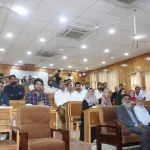The current condition of professionalism is a deeply disturbing sickness that pervades the socio-economic fabric of the Kashmir. The development of the region has been long hindered by a pervasive culture of unprofessionalism across the public and private spheres, even as the population is renowned for their abilities and resilience.These problems, varying from immoral workplace conduct and overworked employees to rampant nepotism and incompetence, are not administrative errors; they are ethical and legal shortcomings that imperil the fabric of progress. The beacon that should guide behaviour in the workplace, professional ethics, seems to be largely absent from much of Kashmir’s labour market.Offices with irregular attendance, frequent delays, and a tendency to prioritize personal favours over merit are not something new to the employment environment here. Many employees report that they are often asked to perform tasks far beyond the scope of their position, often without additional compensation or acknowledgement.Aside from demoralizing the employees, this intrusion undermines the focus and effectiveness necessary to excel in one’s own area of specialty. Legally, this contravenes the underlying principles of labour legislation, such as the equitable distribution of the workload, right to unambiguous terms of employment and safeguarding against forced labour as specified in the Indian Constitution and legislation like the Industrial Disputes Act, 1947 and the Factories Act, 1948.Unpaid internships, excessive working hours with no overtime, and refusal to provide basic benefits such as maternity leave are widespread in Kashmir’s private sector. Employees are frequently brought on board informally, without contracts, and are thus susceptible to dismissal at will. Legally, this disregards provision of the Contract Labour (Regulation and Abolition) Act, 1970, which prescribes registration of contract workers, reasonable wages, and good working conditions.
In both public and private sector, professionalism is also undermined by political patronage, lobbying, and nepotism. Recruitment then becomes dependent on who you know rather than your merit. People with no qualifications hold powerful posts based on their connections, pushing out more qualified and deserving ones. This undermines public confidence and makes important services less effective.For example, jobs in education, health, and public welfare departments that have a direct bearing on human lives are usually allotted to candidates who don’t have the necessary training. This is not only contrary to the intent of equal opportunity of public employment as envisaged under Article 16 of the Indian Constitution, but also contrary to the right of the people to decent public services.Another less-well-documented but common problem in Kashmir is the psychological and physical drain on employees who are compelled to multitask or replace absent co-workers. Employees are reportedly assigned clerical duties, field work, and extracurricular errands simultaneously, without adequate pay or reward. Legally, this is a violation of the right to work conditions, a right enshrined in national law as well as in international conventions like the International Labour Organization (ILO) conventions to which India is signatory. But laws notwithstanding, enforcement is a joke.There is no meaningful labour inspection mechanism in Kashmir. Unions, if they exist at all, tend to be weak or are co-opted. Workers who protest against injustice are harassed, transferred, or dismissed. Whistle-blower protection, as envisioned in legislation such as the Whistle Blowers Protection Act, 2014, is in effect non-existent on the ground.Being professional is not merely about dressing appropriately or communicating effectively. Being professional is about maintaining fairness, accountability, and respect in the workplace. And that should be institutionalized in the form of legal safeguards, ethical leadership, and cultural change.Institutions should form and implement written job descriptions, code of conduct policies, and grievance redressal mechanisms. Labour departments should be empowered to ensure labour law compliance. Every workplace, public or private, should have legally compliant contracts, pay slips, and leave policies.All public recruitment should be openly done through tests and overseen by impartial organizations. This not only complies with constitutional requirements but also reinstates honour to public service.
Considering the rampant abuses, the union territory requires an outright Labour Ombudsman—an impartial organization tasked with auditing workplaces, investigating grievances, and advising action.Managers and administrators are required to undergo training in labour laws as well as workplace ethics. Promotions should not only be based on years of service, but also on leadership qualities that can be demonstrated, fairness, and team-building skills.NGOs, student unions, and activists have to be nudged to report and monitor violations. Whistle-blower protection statutes must actively be enforced to prevent whistle-blowers from being victimized.Professional ethics, workers’ rights, and citizens’ duty must be included in school, college, and training school curricula. An individual joining the workforce should be aware not just of how to construct a CV but also of his/her legal and ethical entitlements as a worker.Ultimately, the professional crisis in Kashmir cannot be tackled by law alone but needs a change in values on the part of society. Too frequently, being successful is measured by whom one is able to dominate or keep out. We need to leave such a zero-sum game behind. Real advancement is not constructed through bringing down others but through constructing institutions where all can rise together.
Kashmir holds tremendous potential. Its young people are talented, creative, and anxious to give their best. But their best will still be thwarted unless we repair the fractured professional culture. We do not need heroes—we need systems. We do not need workarounds we need standards. And most of all, we must understand that professionalism is not a nicety for tranquil societies it is the very basis on which to become one.Let this be the decade when we cease to accept mediocrity, nepotism, and exploitation. Let Kashmir flourish not merely in scenic loveliness or maudlin poetry—but in ethics, equity, and excellence.(Author is Law Student at Kashmir University and has received a gold medal in LL.M, school of Law, batch 2021)








